Specially for the Livyi Bereh portal
After 2014 early parliamentary elections, a parliamentary coalition comprising five different factions was formed in the Verkhovna Rada of Ukraine on VIII convocation. They were supposed not only to reach cooperation, but also to determine Parliament's place in the triangle of Ukrainian politics "Parliament – President – Government". The factions comprising parliamentary majority did have disputes about particular decisions of the Parliament, but these were inter-coalition disputes for a long time.
Will the coalition manage to keep its importance in the political process and avoid the split? There is no definite answer to this question, taking into consideration that some MPs announced they are going to leave the Petro Poroshenko Block. Nevertheless, this coalition is more successful in comparison to the parliamentary majority of the previous convocation. It has tried to secure the institutional independence of the Parliament and showed it's able to hold internal discussions.
In spite of post-electoral forecasts, such a "wide" coalition between five factions has demonstrated it can coordinate interests and prevent acute political conflicts. The fact that factions comprising the coalition have different program principles and electoral positioning is a plus for them, allowing to strengthen institutional independence of the Parliament. However, when MPs publicly violate the coalition's unity or form unexpected alliances with some members of the majority and factions not in the coalition, they hazard coalition's image, the way it happened when the Opposition Block was attracted to the appointment of V. Shokin as a Prosecutor General. As long as neither the President nor the Government control the parliamentary majority, they have managed to divide their responsibilities. Thus, the President has recently used this chance to adjust his strategy of peaceful crisis settlement in Donbas through a discussion in the Parliament. Internal destabilization of parliamentary factions and MPs changing factions hazard the future of the coalition and degrade political responsibility.
Margin of strength: how MPs in the coalition vote?
As long as the coalition is formed in the Verkhovna Rada, political responsibility and predictability of decisions taken by newly-elected MPs should be on the first place. Ukrainian Parliament will be supported by the public if the Coalition Agreement is being implemented, members of the coalition openly discuss all the issues and don't enter in any shadow agreements with factions not in the coalition. We have compared how efficient and simultaneous the parliamentary majority votes.
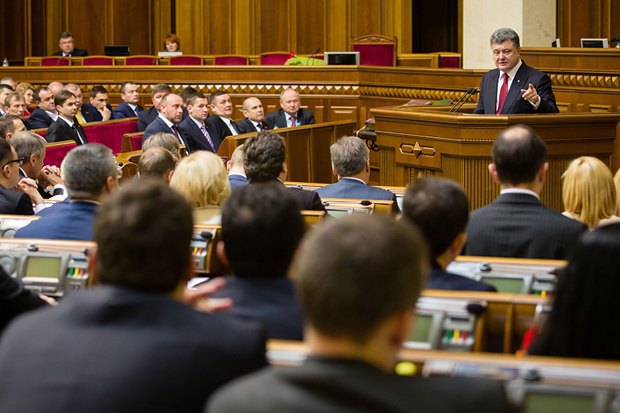
Photos: dyvys.in
On the basis of 730 votings held in the newly-elected Parliament, we can state that the coalition is functioning stably. Besides that, there is political competition and inter-party discussions.
Decisions considered by the Parliament were supported most often by People's Front faction (75% of votings) and the Radical Party of Oleh Liashko (69%). The Samopomich faction was least supportive – 58% votings "for".
Thus, the fact that factions supported 58% - 75% of considered bills means that there are no "sham" members in the coalition, which would constantly remain in opposition to decision of political partners or diminishing their influence in decision-making.
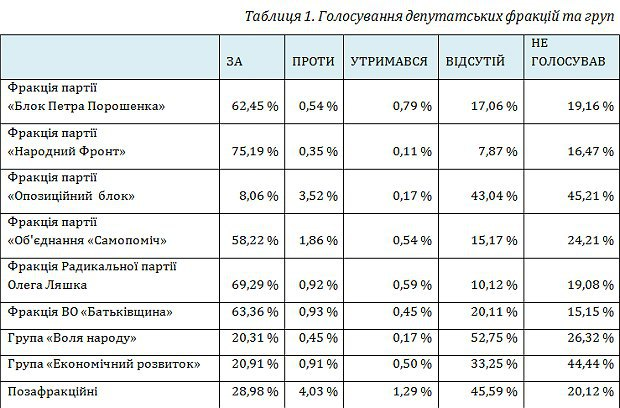
Decision-making statistics shows that there is no monopoly on political influence in the parliamentary majority. As we can see, the Parliament of VIII convocation differs in this regard from the parliament elected in 2012, heavily influenced by the President, Government, and the "top" party in the coalition.
On one side, members of the coalition were aimed to demonstrate that they coordinate their actions. On the other side, they have to take into consideration electoral and other risks of supporting the certain bills. The People's Front faction had the strongest motivation to to support bills, as long as it has a status of "pro-governmental" political party. As for the other coalition members, particularly the Samopomich, they determine their political position more freely.
In the Verkhovna Rada of VIII convocation, the People's Front party voted in consolidation with both the Petro Poroshenko Block and the Radical Party of Oleh Liashko. However, its consolidation with the Samopomich party was much weaker (consolidated voting results were taken on the Rada website created by the OPORA http://rada.oporaua.org/).
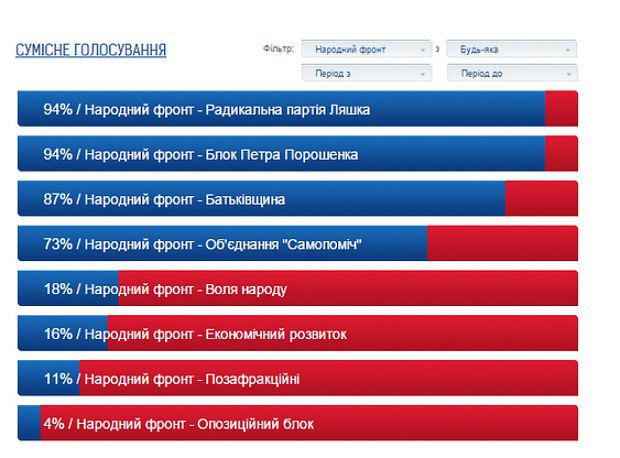
Not surprisingly, the People's Front became the closest partner in the coalition for the Petro Poroshenko Block. At the same time, the PPB voted with the Radical Party of Oleh Liashko more rarely than the People's Front.
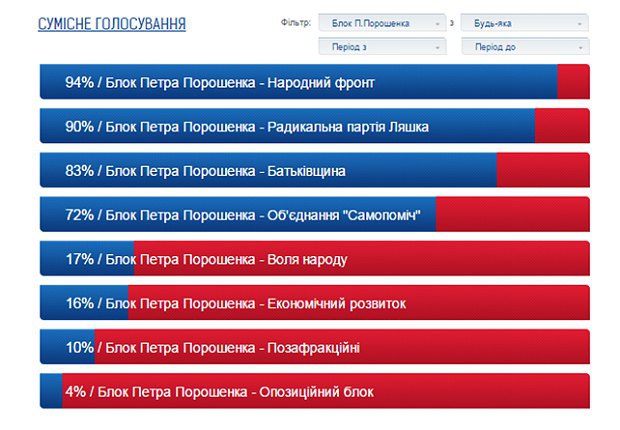
The Samopomich party was the most independent, it joined other coalition members in the voting least often. Thus, there is minimal number of instances when the Samopomich voted "for" simultaneously with the AUU Batkivshchyna, which is also a member of the coalition.
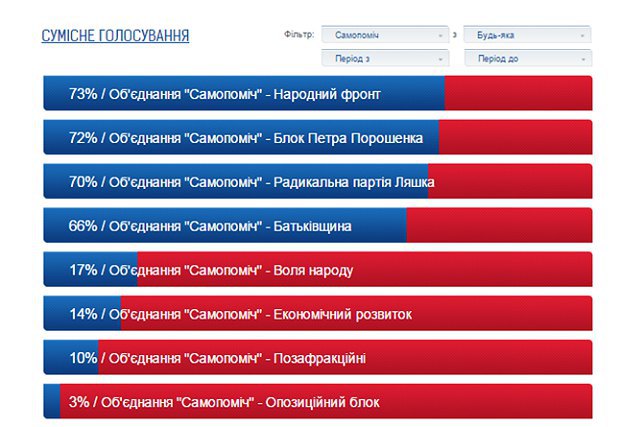
The Radical Party of Oleh Liashko has proved itself as a stable coalition member, which votes "for" with the largest factions in the Parliament – People's Front, and Petro Poroshenko Block.
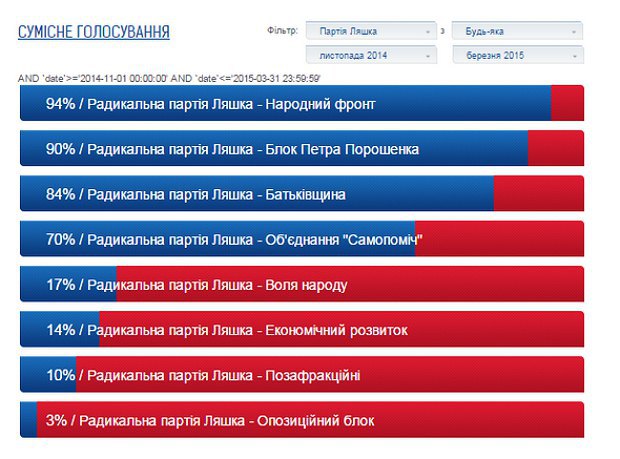
AUU Batkivshchyna was voting the most often with People's Front, Radical Party of Oleh Liashko, and Petro Poroshenko Block; the least often – with the Samopomich.
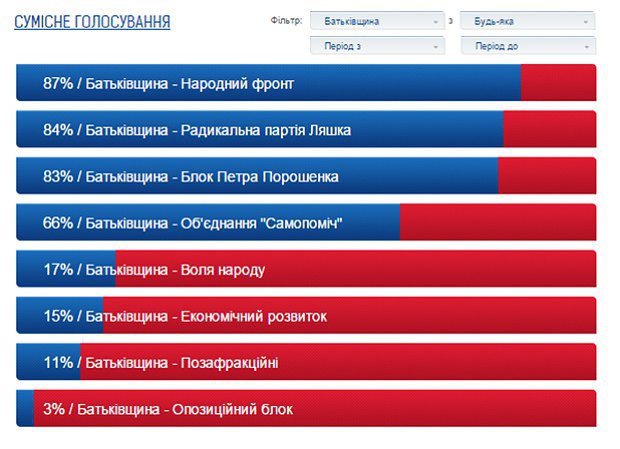
However, coalition members in the newly-elected Parliament have repeatedly showed they have different stands. For example, the bill on quorum of general assembly of joint-stock companies with majority state corporate rights (bill #1310) turned out to be the most controversial for People's Front. It has received the smallest number of votes the People's Front gave for any bill approved in the Parliament (only 13 votes of 81 possible). The conflict with Ihor Kolomoiskyi has also started with this very bill.
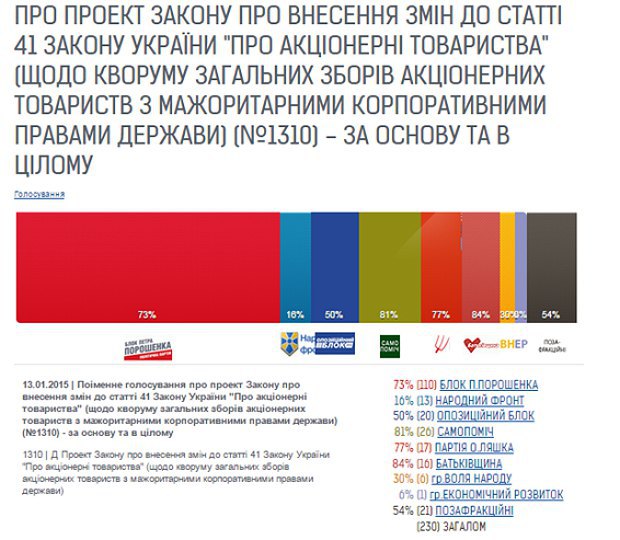
Petro Poroshenko Block proved unyielding on consideration of the certain economic initiatives submitted by the Cabinet of Ministers of Ukraine. Samopomich and Radical Party of Oleh Liashko have openly refused to support the appointment of Viktor Shokin as the Prosecutor General of Ukraine.
At the same time, the Radical Party of Oleh Liashko and AUU Batkivshchyna used a demarche when the status of the certain raions of Donetsk and Luhansk oblasts was under consideration.
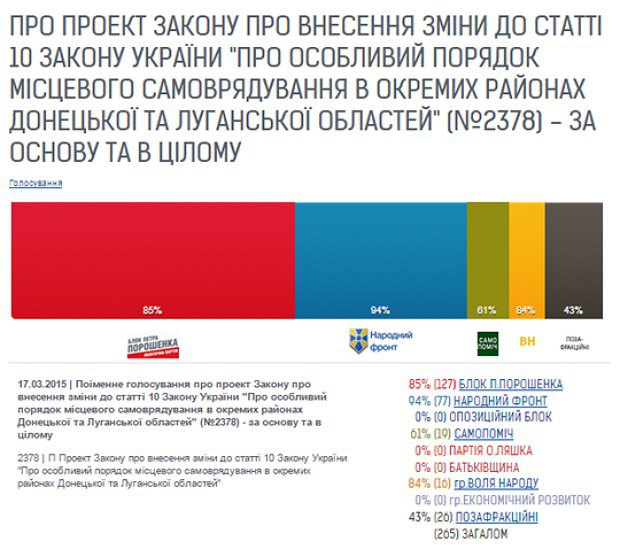
Nevertheless, despite the coalition had some disputes when taking resonant decisions, they didn't become fatal for its political integrity. Members of the parliamentary majority retain from destabilizing steps not to loose electoral support in case of coalition split or if the public associates them with the Opposition Block.
Institutional independence of the Parliament
Institutional independence of other government branches, especially executive, is a vital precondition for the functioning of the single legislative body. Independence doesn't mean conflicts between co-existing authorities, but it means that the Parliament can take decisions on the issues in their authority independently. Non-public visits of Viktor Yanukovychto the Verkhovna Rada of Ukraine of VII convocation aimed to put MPs under pressure were the peak of Parliament's dependence. At the same time, according to OPORA's calculations, more than 60% of bills passed during the first half-year of the Parliament of previous convocation were prepared by then-President and Government.
The newly-elected Parliament faced two somehow contrary goals. On one side, taking into consideration a complicated socio-economical and safety situation in the country, the Verkhovna Rada of Ukraine has to promptly consider Presidential and Governmental initiatives. On the other side, the parliamentary majority mustn't become a weak-willed supporter of bills introduced by the President and Government. According to the processed data, the coalition has managed to adhere to both these preconditions.
The newly-elected Parliament has successfully considered 428 bills and draft resolutions of the Verkhovna Rada of Ukraine. More than 62% of passed bills and resolutions were initiated by MPs of Ukraine, 28% – by the Government, and more than 9% by the President. At the same time, the Parliament has managed to consider 87% of initiatives registered by the Cabinet of Ministers of Ukraine, and 100% of initiatives introduced by the President. 62% of Government and 69% of Presidential initiatives were supported by the Parliament.
Analyst at the Civil Network OPORA